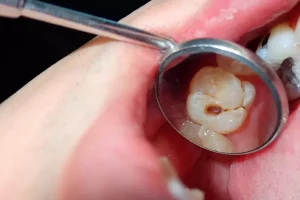
Mouth Dryness
Nature’s strongest defense against tooth decay is saliva. It can assist dislodge plaque bacteria by washing away sugary food residues that plaque bacteria feed on. Saliva can also aid in the remineralization process, which can help to heal tooth decay to a limited extent. As a result, those who have little saliva production or have a dry mouth are more likely to acquire cavities.
Crowded teeth
Teeth that are crooked, crowded, or overlapping are more likely to have nooks and crevices where plaque bacteria may grow unabated by your toothbrush. This is why flossing and brushing everyday are so vital for preventing tooth decay.
Dental Restorations That Are Already in Place
If you’ve already had a cavity, you’re likely to have another, especially if your dental hygiene practices don’t change. Even if you improve your brushing and flossing habits, germs can build along the border of the repair, whether it’s a filling or a crown, and cause more deterioration.
Receding gums
The roots of the teeth may become visible as the gums recede (perhaps due to gum disease). Because roots are not covered by dental enamel, they are not as well protected against decay as the rest of the tooth. To make matters worse, cleaning below the gum line is tough, thus exposed roots may not be adequately cleaned. If decay spreads to the roots, you may need a root canal or the tooth may be lost.
Erosion of the Enamel
Enamel erosion is another prevalent cause of tooth decay and cavities. Tooth enamel wears away as a result of extreme abrasion (from overbrushing or grinding) or acid exposure (from food and drink). Enamel that is thinner is more prone to cavities caused by plaque bacteria.
Medical Problems
Increased risk of tooth decay and cavities has been related to medical illnesses that reduce saliva production or modify the pH of the mouth. Diabetes, acid reflux, and allergic rhinitis are all examples of this. Antidepressants and antiepileptic medications, for example, can produce dry mouth.
Addictions
An addiction to nicotine or some medications can be harmful to your teeth. Smoking increases dry mouth, and heroin and other drugs users frequently acquire a sweet craving, which stimulates plaque bacteria to produce more acid. Due to a combination of drug effects and behavioral changes that do not promote good oral health, methamphetamine addiction is a particularly well-known contributor to tooth decay.
If you are worried about tooth decay, contact California Dental Group at 800-407-0161 for help.

